Effective Practical in Science with Emphasis on Biology, GCSE
VerifiedAdded on 2023/01/03
|11
|3578
|3
Report
AI Summary
This report delves into the significance of effective practical work in science, with a specific emphasis on biology education. It begins by defining practical work and highlighting its crucial role in scientific learning, emphasizing the importance of hands-on experiments and observation for understanding scientific concepts and fostering engagement. The report then explores the evolution of biology education, including the introduction of required practicals in GCSE specifications like AQA, and the impact of these practicals on student assessment. The main body of the report discusses various aspects of effective practicals, including the aims of practical work, such as encouraging accurate observation and making scientific phenomena more tangible. It also addresses the challenges and issues related to teaching biology, such as abstract concepts and the lack of relevancy to real-life applications, and suggests strategies to overcome these, including visual aids, experiments, and field studies. Furthermore, it examines the pedagogical approaches and the role of teachers in facilitating effective learning environments. The report concludes by summarizing the key findings and emphasizing the importance of continuous evolution in biology education to meet both educational goals and societal aspirations.
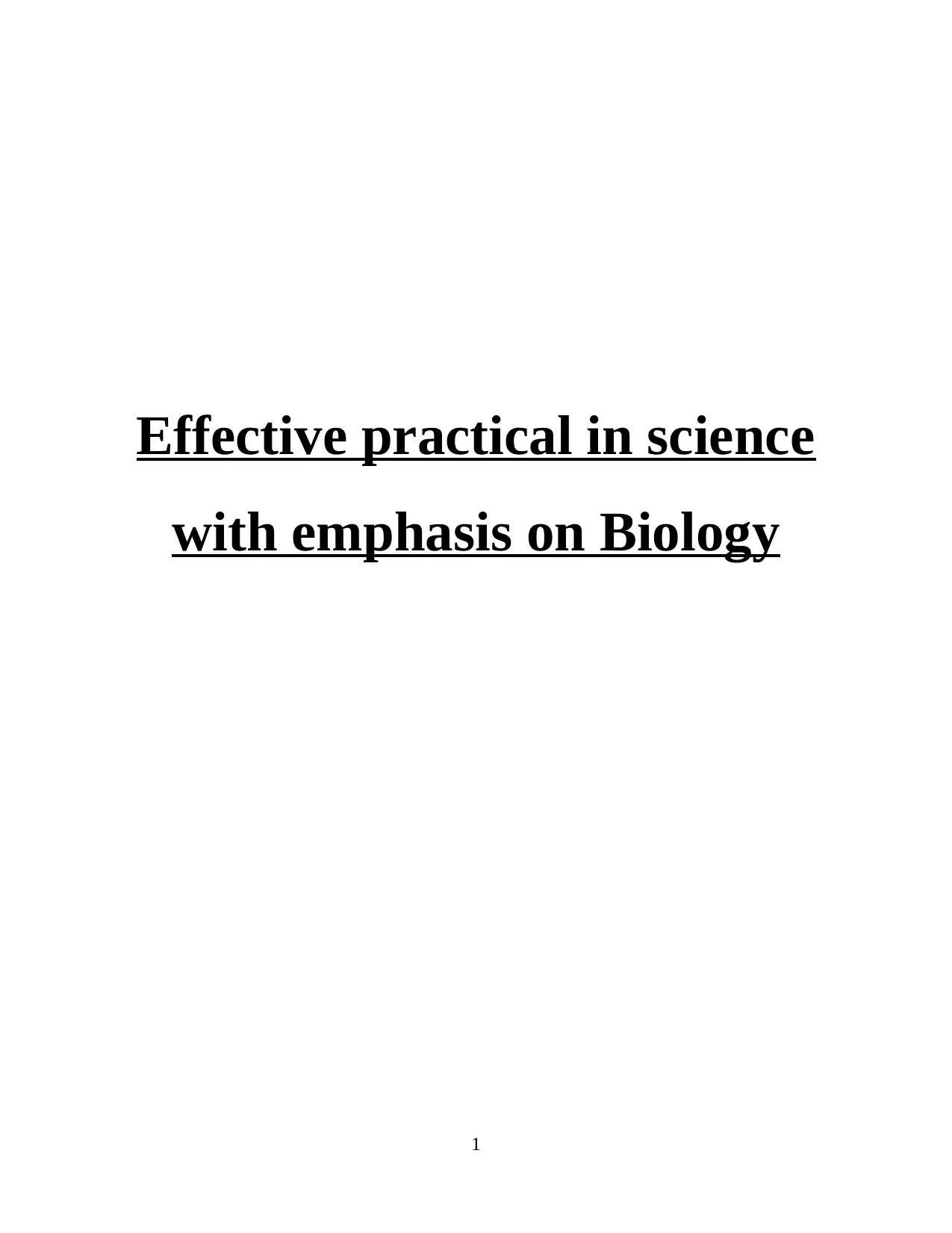
Effective practical in science
with emphasis on Biology
1
with emphasis on Biology
1
Paraphrase This Document
Need a fresh take? Get an instant paraphrase of this document with our AI Paraphraser
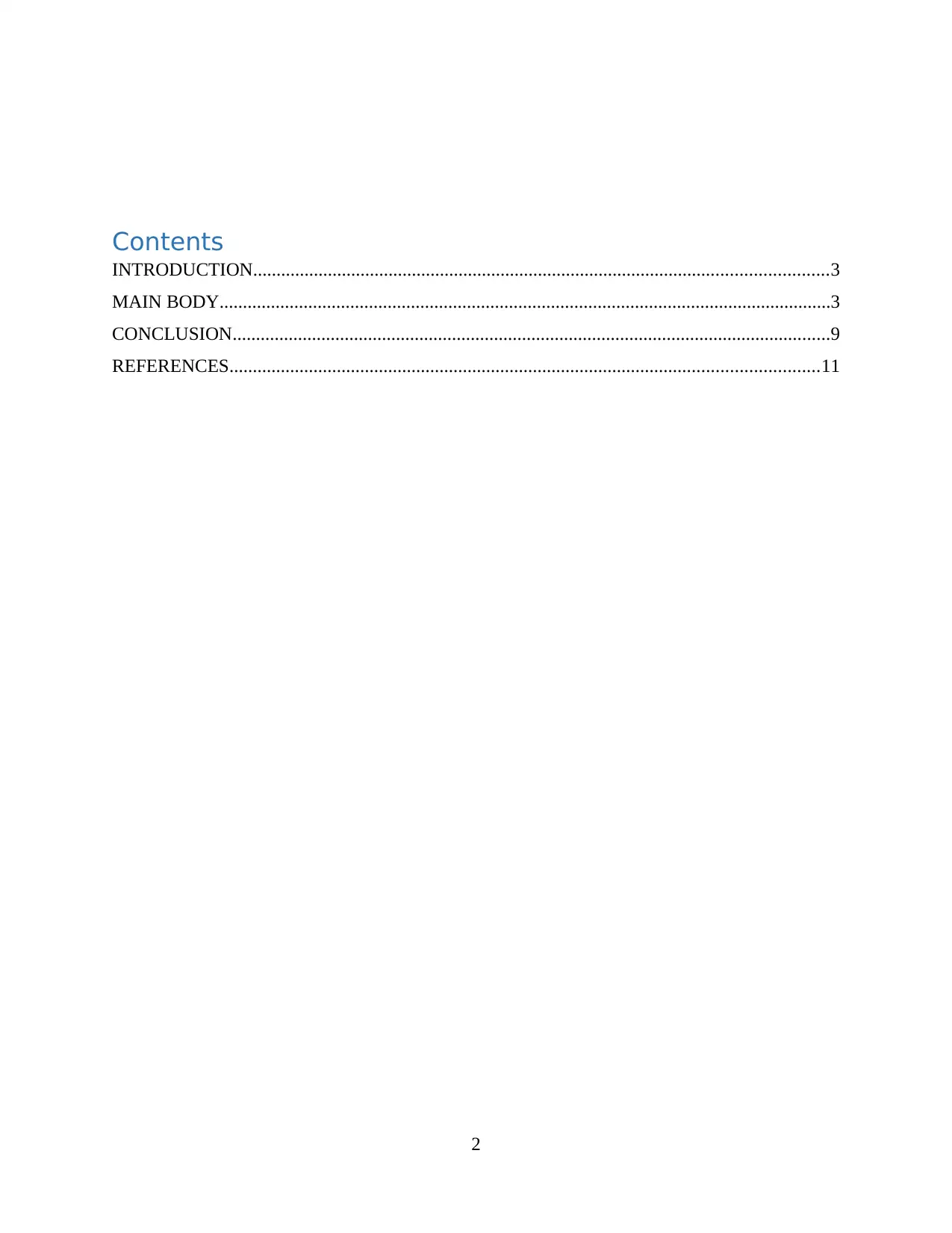
Contents
INTRODUCTION...........................................................................................................................3
MAIN BODY...................................................................................................................................3
CONCLUSION................................................................................................................................9
REFERENCES..............................................................................................................................11
2
INTRODUCTION...........................................................................................................................3
MAIN BODY...................................................................................................................................3
CONCLUSION................................................................................................................................9
REFERENCES..............................................................................................................................11
2
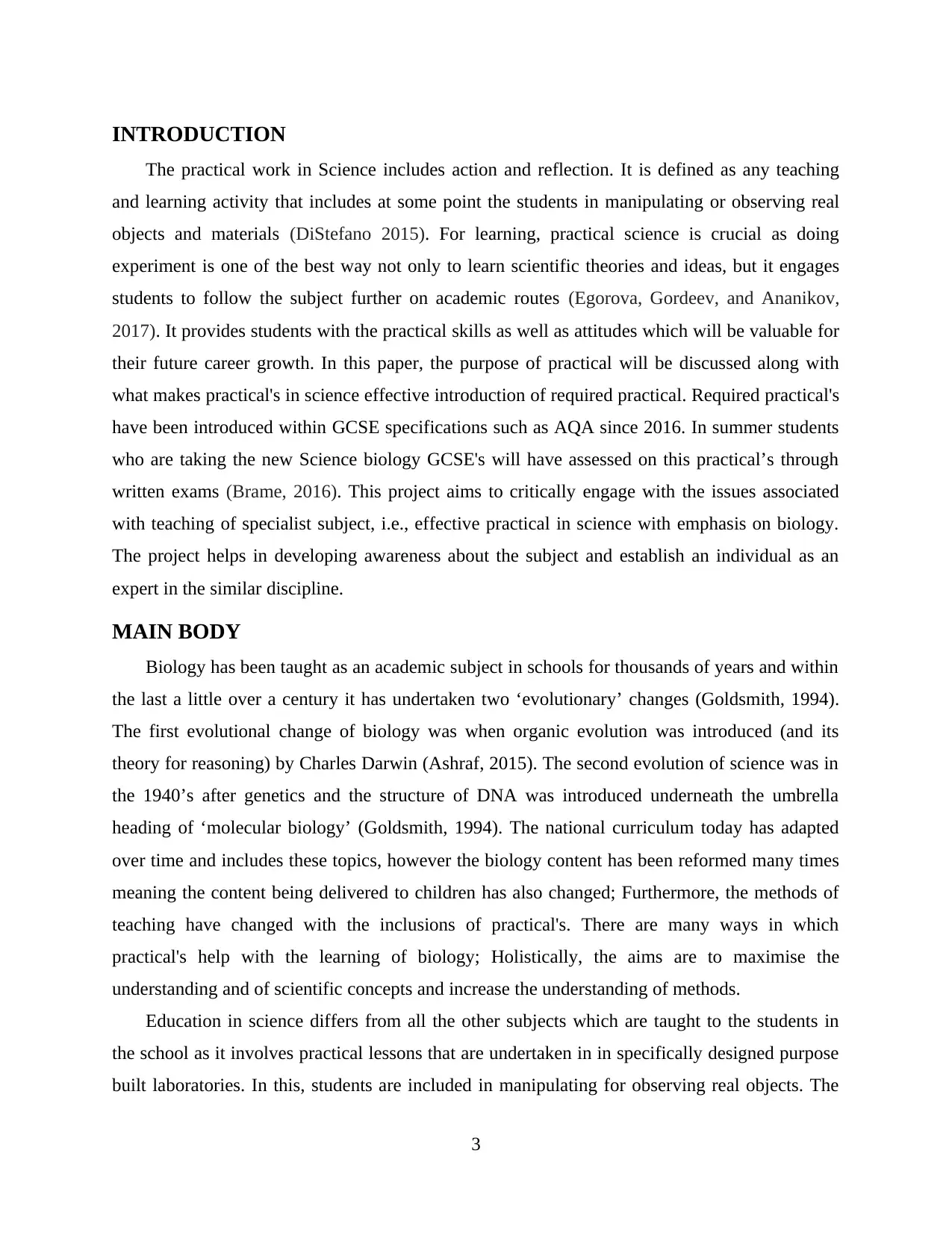
INTRODUCTION
The practical work in Science includes action and reflection. It is defined as any teaching
and learning activity that includes at some point the students in manipulating or observing real
objects and materials (DiStefano 2015). For learning, practical science is crucial as doing
experiment is one of the best way not only to learn scientific theories and ideas, but it engages
students to follow the subject further on academic routes (Egorova, Gordeev, and Ananikov,
2017). It provides students with the practical skills as well as attitudes which will be valuable for
their future career growth. In this paper, the purpose of practical will be discussed along with
what makes practical's in science effective introduction of required practical. Required practical's
have been introduced within GCSE specifications such as AQA since 2016. In summer students
who are taking the new Science biology GCSE's will have assessed on this practical’s through
written exams (Brame, 2016). This project aims to critically engage with the issues associated
with teaching of specialist subject, i.e., effective practical in science with emphasis on biology.
The project helps in developing awareness about the subject and establish an individual as an
expert in the similar discipline.
MAIN BODY
Biology has been taught as an academic subject in schools for thousands of years and within
the last a little over a century it has undertaken two ‘evolutionary’ changes (Goldsmith, 1994).
The first evolutional change of biology was when organic evolution was introduced (and its
theory for reasoning) by Charles Darwin (Ashraf, 2015). The second evolution of science was in
the 1940’s after genetics and the structure of DNA was introduced underneath the umbrella
heading of ‘molecular biology’ (Goldsmith, 1994). The national curriculum today has adapted
over time and includes these topics, however the biology content has been reformed many times
meaning the content being delivered to children has also changed; Furthermore, the methods of
teaching have changed with the inclusions of practical's. There are many ways in which
practical's help with the learning of biology; Holistically, the aims are to maximise the
understanding and of scientific concepts and increase the understanding of methods.
Education in science differs from all the other subjects which are taught to the students in
the school as it involves practical lessons that are undertaken in in specifically designed purpose
built laboratories. In this, students are included in manipulating for observing real objects. The
3
The practical work in Science includes action and reflection. It is defined as any teaching
and learning activity that includes at some point the students in manipulating or observing real
objects and materials (DiStefano 2015). For learning, practical science is crucial as doing
experiment is one of the best way not only to learn scientific theories and ideas, but it engages
students to follow the subject further on academic routes (Egorova, Gordeev, and Ananikov,
2017). It provides students with the practical skills as well as attitudes which will be valuable for
their future career growth. In this paper, the purpose of practical will be discussed along with
what makes practical's in science effective introduction of required practical. Required practical's
have been introduced within GCSE specifications such as AQA since 2016. In summer students
who are taking the new Science biology GCSE's will have assessed on this practical’s through
written exams (Brame, 2016). This project aims to critically engage with the issues associated
with teaching of specialist subject, i.e., effective practical in science with emphasis on biology.
The project helps in developing awareness about the subject and establish an individual as an
expert in the similar discipline.
MAIN BODY
Biology has been taught as an academic subject in schools for thousands of years and within
the last a little over a century it has undertaken two ‘evolutionary’ changes (Goldsmith, 1994).
The first evolutional change of biology was when organic evolution was introduced (and its
theory for reasoning) by Charles Darwin (Ashraf, 2015). The second evolution of science was in
the 1940’s after genetics and the structure of DNA was introduced underneath the umbrella
heading of ‘molecular biology’ (Goldsmith, 1994). The national curriculum today has adapted
over time and includes these topics, however the biology content has been reformed many times
meaning the content being delivered to children has also changed; Furthermore, the methods of
teaching have changed with the inclusions of practical's. There are many ways in which
practical's help with the learning of biology; Holistically, the aims are to maximise the
understanding and of scientific concepts and increase the understanding of methods.
Education in science differs from all the other subjects which are taught to the students in
the school as it involves practical lessons that are undertaken in in specifically designed purpose
built laboratories. In this, students are included in manipulating for observing real objects. The
3
⊘ This is a preview!⊘
Do you want full access?
Subscribe today to unlock all pages.

Trusted by 1+ million students worldwide
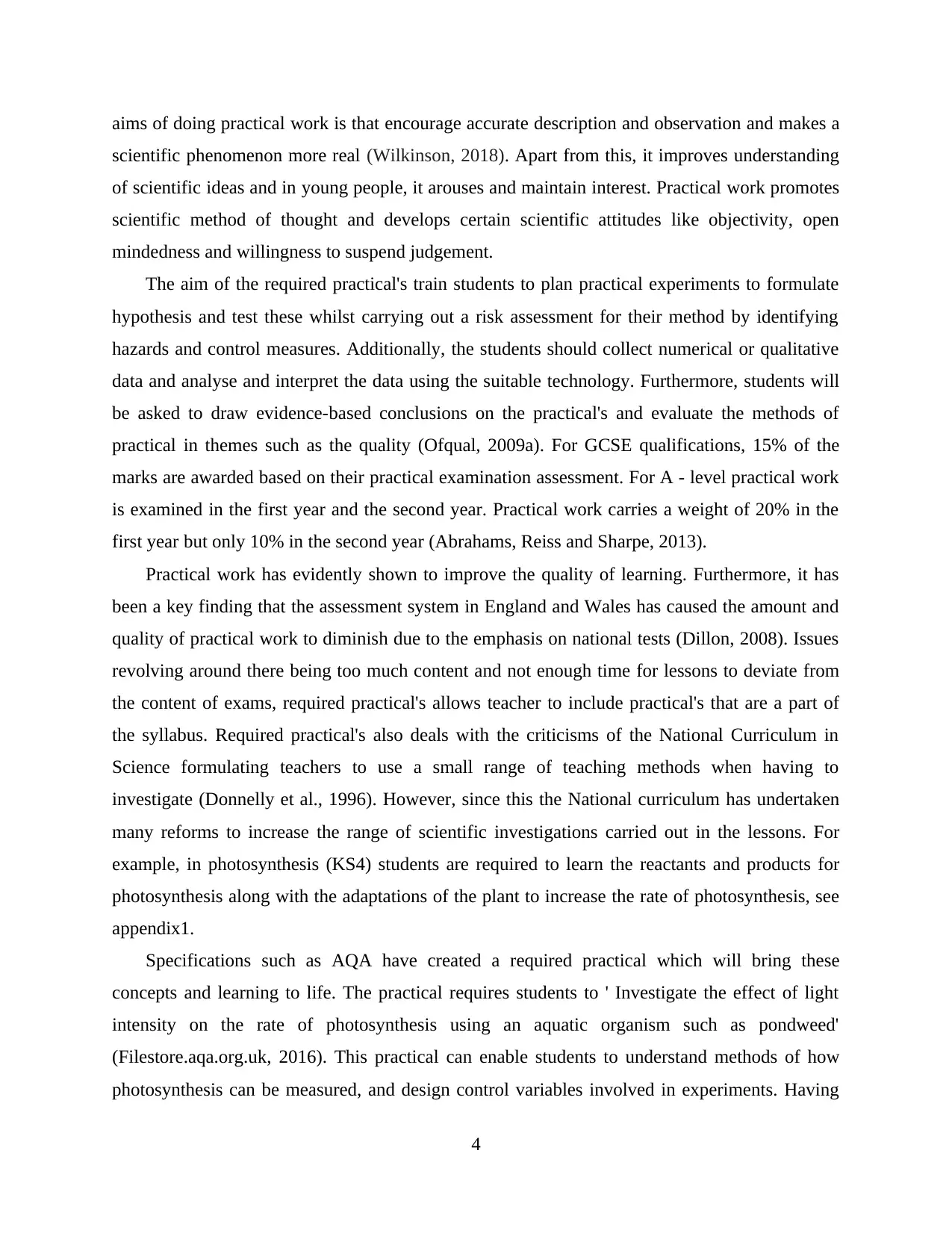
aims of doing practical work is that encourage accurate description and observation and makes a
scientific phenomenon more real (Wilkinson, 2018). Apart from this, it improves understanding
of scientific ideas and in young people, it arouses and maintain interest. Practical work promotes
scientific method of thought and develops certain scientific attitudes like objectivity, open
mindedness and willingness to suspend judgement.
The aim of the required practical's train students to plan practical experiments to formulate
hypothesis and test these whilst carrying out a risk assessment for their method by identifying
hazards and control measures. Additionally, the students should collect numerical or qualitative
data and analyse and interpret the data using the suitable technology. Furthermore, students will
be asked to draw evidence-based conclusions on the practical's and evaluate the methods of
practical in themes such as the quality (Ofqual, 2009a). For GCSE qualifications, 15% of the
marks are awarded based on their practical examination assessment. For A - level practical work
is examined in the first year and the second year. Practical work carries a weight of 20% in the
first year but only 10% in the second year (Abrahams, Reiss and Sharpe, 2013).
Practical work has evidently shown to improve the quality of learning. Furthermore, it has
been a key finding that the assessment system in England and Wales has caused the amount and
quality of practical work to diminish due to the emphasis on national tests (Dillon, 2008). Issues
revolving around there being too much content and not enough time for lessons to deviate from
the content of exams, required practical's allows teacher to include practical's that are a part of
the syllabus. Required practical's also deals with the criticisms of the National Curriculum in
Science formulating teachers to use a small range of teaching methods when having to
investigate (Donnelly et al., 1996). However, since this the National curriculum has undertaken
many reforms to increase the range of scientific investigations carried out in the lessons. For
example, in photosynthesis (KS4) students are required to learn the reactants and products for
photosynthesis along with the adaptations of the plant to increase the rate of photosynthesis, see
appendix1.
Specifications such as AQA have created a required practical which will bring these
concepts and learning to life. The practical requires students to ' Investigate the effect of light
intensity on the rate of photosynthesis using an aquatic organism such as pondweed'
(Filestore.aqa.org.uk, 2016). This practical can enable students to understand methods of how
photosynthesis can be measured, and design control variables involved in experiments. Having
4
scientific phenomenon more real (Wilkinson, 2018). Apart from this, it improves understanding
of scientific ideas and in young people, it arouses and maintain interest. Practical work promotes
scientific method of thought and develops certain scientific attitudes like objectivity, open
mindedness and willingness to suspend judgement.
The aim of the required practical's train students to plan practical experiments to formulate
hypothesis and test these whilst carrying out a risk assessment for their method by identifying
hazards and control measures. Additionally, the students should collect numerical or qualitative
data and analyse and interpret the data using the suitable technology. Furthermore, students will
be asked to draw evidence-based conclusions on the practical's and evaluate the methods of
practical in themes such as the quality (Ofqual, 2009a). For GCSE qualifications, 15% of the
marks are awarded based on their practical examination assessment. For A - level practical work
is examined in the first year and the second year. Practical work carries a weight of 20% in the
first year but only 10% in the second year (Abrahams, Reiss and Sharpe, 2013).
Practical work has evidently shown to improve the quality of learning. Furthermore, it has
been a key finding that the assessment system in England and Wales has caused the amount and
quality of practical work to diminish due to the emphasis on national tests (Dillon, 2008). Issues
revolving around there being too much content and not enough time for lessons to deviate from
the content of exams, required practical's allows teacher to include practical's that are a part of
the syllabus. Required practical's also deals with the criticisms of the National Curriculum in
Science formulating teachers to use a small range of teaching methods when having to
investigate (Donnelly et al., 1996). However, since this the National curriculum has undertaken
many reforms to increase the range of scientific investigations carried out in the lessons. For
example, in photosynthesis (KS4) students are required to learn the reactants and products for
photosynthesis along with the adaptations of the plant to increase the rate of photosynthesis, see
appendix1.
Specifications such as AQA have created a required practical which will bring these
concepts and learning to life. The practical requires students to ' Investigate the effect of light
intensity on the rate of photosynthesis using an aquatic organism such as pondweed'
(Filestore.aqa.org.uk, 2016). This practical can enable students to understand methods of how
photosynthesis can be measured, and design control variables involved in experiments. Having
4
Paraphrase This Document
Need a fresh take? Get an instant paraphrase of this document with our AI Paraphraser
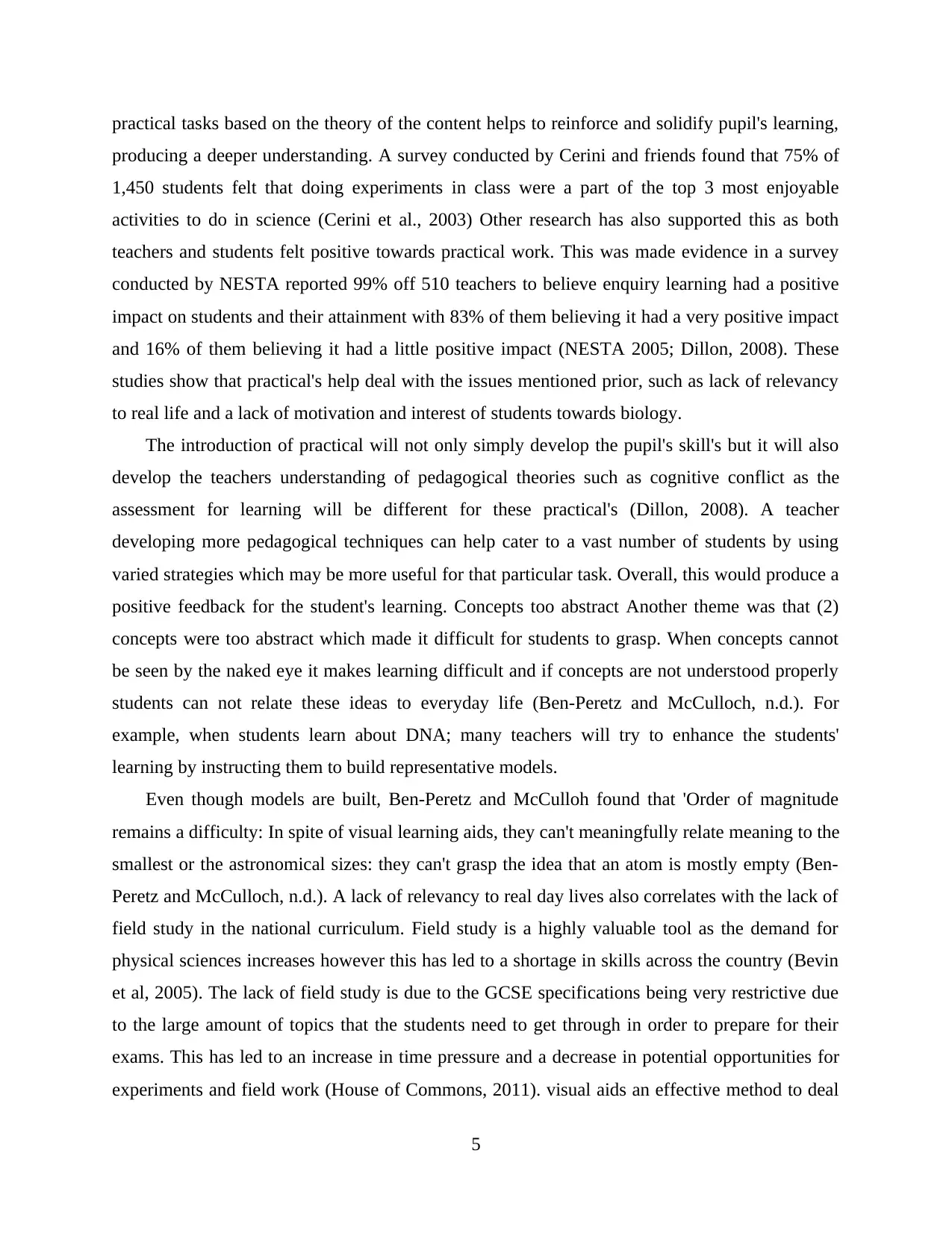
practical tasks based on the theory of the content helps to reinforce and solidify pupil's learning,
producing a deeper understanding. A survey conducted by Cerini and friends found that 75% of
1,450 students felt that doing experiments in class were a part of the top 3 most enjoyable
activities to do in science (Cerini et al., 2003) Other research has also supported this as both
teachers and students felt positive towards practical work. This was made evidence in a survey
conducted by NESTA reported 99% off 510 teachers to believe enquiry learning had a positive
impact on students and their attainment with 83% of them believing it had a very positive impact
and 16% of them believing it had a little positive impact (NESTA 2005; Dillon, 2008). These
studies show that practical's help deal with the issues mentioned prior, such as lack of relevancy
to real life and a lack of motivation and interest of students towards biology.
The introduction of practical will not only simply develop the pupil's skill's but it will also
develop the teachers understanding of pedagogical theories such as cognitive conflict as the
assessment for learning will be different for these practical's (Dillon, 2008). A teacher
developing more pedagogical techniques can help cater to a vast number of students by using
varied strategies which may be more useful for that particular task. Overall, this would produce a
positive feedback for the student's learning. Concepts too abstract Another theme was that (2)
concepts were too abstract which made it difficult for students to grasp. When concepts cannot
be seen by the naked eye it makes learning difficult and if concepts are not understood properly
students can not relate these ideas to everyday life (Ben-Peretz and McCulloch, n.d.). For
example, when students learn about DNA; many teachers will try to enhance the students'
learning by instructing them to build representative models.
Even though models are built, Ben-Peretz and McCulloh found that 'Order of magnitude
remains a difficulty: In spite of visual learning aids, they can't meaningfully relate meaning to the
smallest or the astronomical sizes: they can't grasp the idea that an atom is mostly empty (Ben-
Peretz and McCulloch, n.d.). A lack of relevancy to real day lives also correlates with the lack of
field study in the national curriculum. Field study is a highly valuable tool as the demand for
physical sciences increases however this has led to a shortage in skills across the country (Bevin
et al, 2005). The lack of field study is due to the GCSE specifications being very restrictive due
to the large amount of topics that the students need to get through in order to prepare for their
exams. This has led to an increase in time pressure and a decrease in potential opportunities for
experiments and field work (House of Commons, 2011). visual aids an effective method to deal
5
producing a deeper understanding. A survey conducted by Cerini and friends found that 75% of
1,450 students felt that doing experiments in class were a part of the top 3 most enjoyable
activities to do in science (Cerini et al., 2003) Other research has also supported this as both
teachers and students felt positive towards practical work. This was made evidence in a survey
conducted by NESTA reported 99% off 510 teachers to believe enquiry learning had a positive
impact on students and their attainment with 83% of them believing it had a very positive impact
and 16% of them believing it had a little positive impact (NESTA 2005; Dillon, 2008). These
studies show that practical's help deal with the issues mentioned prior, such as lack of relevancy
to real life and a lack of motivation and interest of students towards biology.
The introduction of practical will not only simply develop the pupil's skill's but it will also
develop the teachers understanding of pedagogical theories such as cognitive conflict as the
assessment for learning will be different for these practical's (Dillon, 2008). A teacher
developing more pedagogical techniques can help cater to a vast number of students by using
varied strategies which may be more useful for that particular task. Overall, this would produce a
positive feedback for the student's learning. Concepts too abstract Another theme was that (2)
concepts were too abstract which made it difficult for students to grasp. When concepts cannot
be seen by the naked eye it makes learning difficult and if concepts are not understood properly
students can not relate these ideas to everyday life (Ben-Peretz and McCulloch, n.d.). For
example, when students learn about DNA; many teachers will try to enhance the students'
learning by instructing them to build representative models.
Even though models are built, Ben-Peretz and McCulloh found that 'Order of magnitude
remains a difficulty: In spite of visual learning aids, they can't meaningfully relate meaning to the
smallest or the astronomical sizes: they can't grasp the idea that an atom is mostly empty (Ben-
Peretz and McCulloch, n.d.). A lack of relevancy to real day lives also correlates with the lack of
field study in the national curriculum. Field study is a highly valuable tool as the demand for
physical sciences increases however this has led to a shortage in skills across the country (Bevin
et al, 2005). The lack of field study is due to the GCSE specifications being very restrictive due
to the large amount of topics that the students need to get through in order to prepare for their
exams. This has led to an increase in time pressure and a decrease in potential opportunities for
experiments and field work (House of Commons, 2011). visual aids an effective method to deal
5
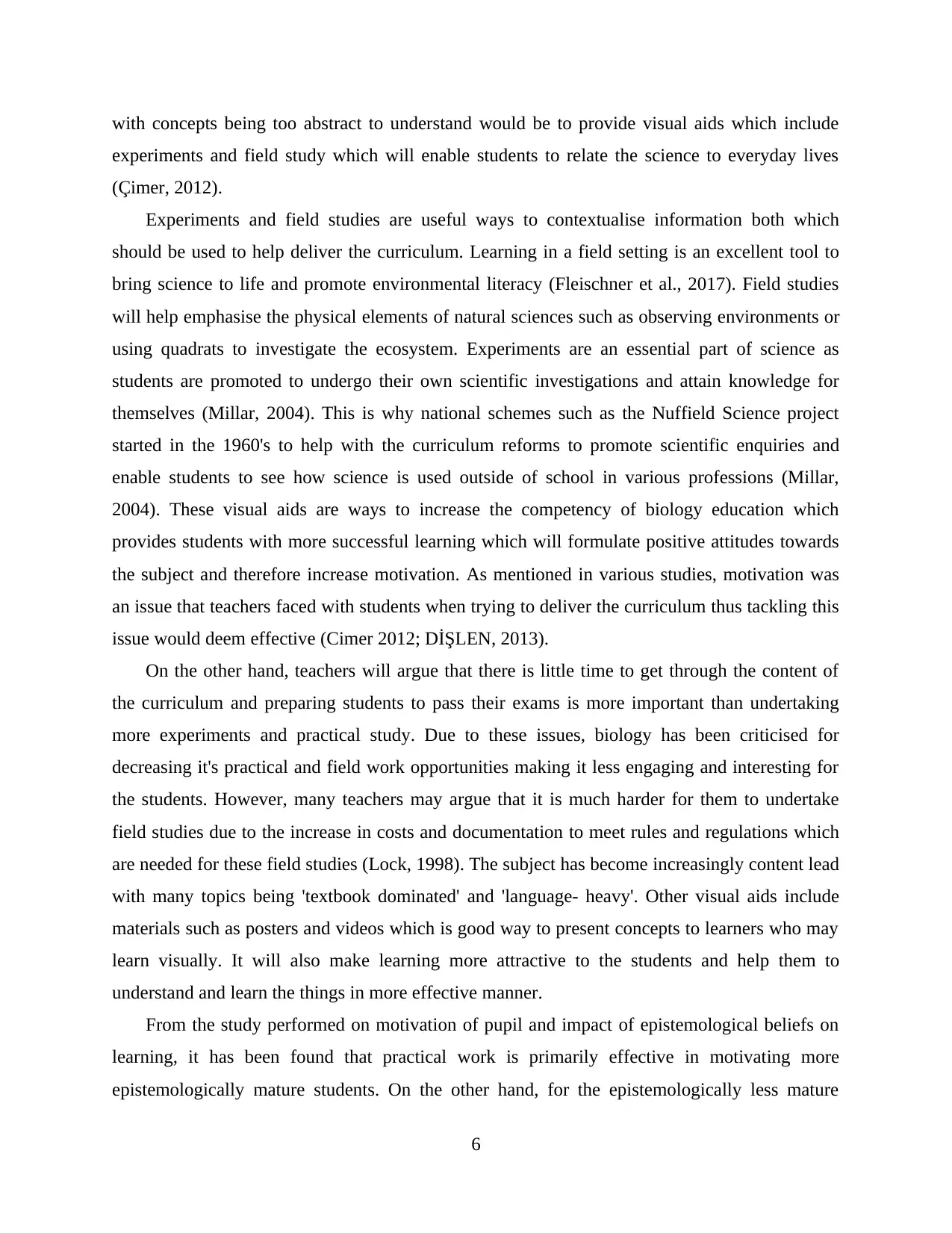
with concepts being too abstract to understand would be to provide visual aids which include
experiments and field study which will enable students to relate the science to everyday lives
(Çimer, 2012).
Experiments and field studies are useful ways to contextualise information both which
should be used to help deliver the curriculum. Learning in a field setting is an excellent tool to
bring science to life and promote environmental literacy (Fleischner et al., 2017). Field studies
will help emphasise the physical elements of natural sciences such as observing environments or
using quadrats to investigate the ecosystem. Experiments are an essential part of science as
students are promoted to undergo their own scientific investigations and attain knowledge for
themselves (Millar, 2004). This is why national schemes such as the Nuffield Science project
started in the 1960's to help with the curriculum reforms to promote scientific enquiries and
enable students to see how science is used outside of school in various professions (Millar,
2004). These visual aids are ways to increase the competency of biology education which
provides students with more successful learning which will formulate positive attitudes towards
the subject and therefore increase motivation. As mentioned in various studies, motivation was
an issue that teachers faced with students when trying to deliver the curriculum thus tackling this
issue would deem effective (Cimer 2012; DİŞLEN, 2013).
On the other hand, teachers will argue that there is little time to get through the content of
the curriculum and preparing students to pass their exams is more important than undertaking
more experiments and practical study. Due to these issues, biology has been criticised for
decreasing it's practical and field work opportunities making it less engaging and interesting for
the students. However, many teachers may argue that it is much harder for them to undertake
field studies due to the increase in costs and documentation to meet rules and regulations which
are needed for these field studies (Lock, 1998). The subject has become increasingly content lead
with many topics being 'textbook dominated' and 'language- heavy'. Other visual aids include
materials such as posters and videos which is good way to present concepts to learners who may
learn visually. It will also make learning more attractive to the students and help them to
understand and learn the things in more effective manner.
From the study performed on motivation of pupil and impact of epistemological beliefs on
learning, it has been found that practical work is primarily effective in motivating more
epistemologically mature students. On the other hand, for the epistemologically less mature
6
experiments and field study which will enable students to relate the science to everyday lives
(Çimer, 2012).
Experiments and field studies are useful ways to contextualise information both which
should be used to help deliver the curriculum. Learning in a field setting is an excellent tool to
bring science to life and promote environmental literacy (Fleischner et al., 2017). Field studies
will help emphasise the physical elements of natural sciences such as observing environments or
using quadrats to investigate the ecosystem. Experiments are an essential part of science as
students are promoted to undergo their own scientific investigations and attain knowledge for
themselves (Millar, 2004). This is why national schemes such as the Nuffield Science project
started in the 1960's to help with the curriculum reforms to promote scientific enquiries and
enable students to see how science is used outside of school in various professions (Millar,
2004). These visual aids are ways to increase the competency of biology education which
provides students with more successful learning which will formulate positive attitudes towards
the subject and therefore increase motivation. As mentioned in various studies, motivation was
an issue that teachers faced with students when trying to deliver the curriculum thus tackling this
issue would deem effective (Cimer 2012; DİŞLEN, 2013).
On the other hand, teachers will argue that there is little time to get through the content of
the curriculum and preparing students to pass their exams is more important than undertaking
more experiments and practical study. Due to these issues, biology has been criticised for
decreasing it's practical and field work opportunities making it less engaging and interesting for
the students. However, many teachers may argue that it is much harder for them to undertake
field studies due to the increase in costs and documentation to meet rules and regulations which
are needed for these field studies (Lock, 1998). The subject has become increasingly content lead
with many topics being 'textbook dominated' and 'language- heavy'. Other visual aids include
materials such as posters and videos which is good way to present concepts to learners who may
learn visually. It will also make learning more attractive to the students and help them to
understand and learn the things in more effective manner.
From the study performed on motivation of pupil and impact of epistemological beliefs on
learning, it has been found that practical work is primarily effective in motivating more
epistemologically mature students. On the other hand, for the epistemologically less mature
6
⊘ This is a preview!⊘
Do you want full access?
Subscribe today to unlock all pages.

Trusted by 1+ million students worldwide
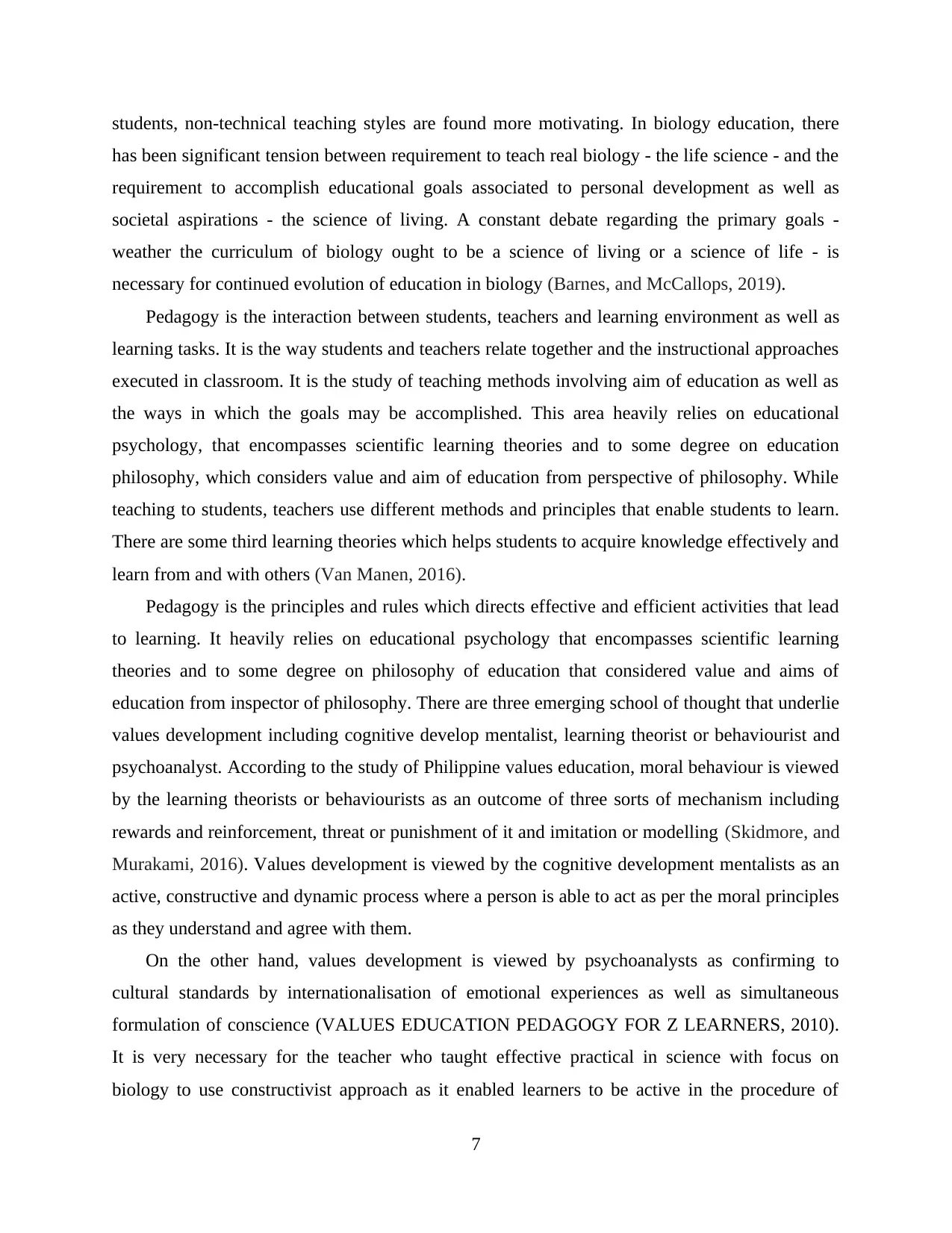
students, non-technical teaching styles are found more motivating. In biology education, there
has been significant tension between requirement to teach real biology - the life science - and the
requirement to accomplish educational goals associated to personal development as well as
societal aspirations - the science of living. A constant debate regarding the primary goals -
weather the curriculum of biology ought to be a science of living or a science of life - is
necessary for continued evolution of education in biology (Barnes, and McCallops, 2019).
Pedagogy is the interaction between students, teachers and learning environment as well as
learning tasks. It is the way students and teachers relate together and the instructional approaches
executed in classroom. It is the study of teaching methods involving aim of education as well as
the ways in which the goals may be accomplished. This area heavily relies on educational
psychology, that encompasses scientific learning theories and to some degree on education
philosophy, which considers value and aim of education from perspective of philosophy. While
teaching to students, teachers use different methods and principles that enable students to learn.
There are some third learning theories which helps students to acquire knowledge effectively and
learn from and with others (Van Manen, 2016).
Pedagogy is the principles and rules which directs effective and efficient activities that lead
to learning. It heavily relies on educational psychology that encompasses scientific learning
theories and to some degree on philosophy of education that considered value and aims of
education from inspector of philosophy. There are three emerging school of thought that underlie
values development including cognitive develop mentalist, learning theorist or behaviourist and
psychoanalyst. According to the study of Philippine values education, moral behaviour is viewed
by the learning theorists or behaviourists as an outcome of three sorts of mechanism including
rewards and reinforcement, threat or punishment of it and imitation or modelling (Skidmore, and
Murakami, 2016). Values development is viewed by the cognitive development mentalists as an
active, constructive and dynamic process where a person is able to act as per the moral principles
as they understand and agree with them.
On the other hand, values development is viewed by psychoanalysts as confirming to
cultural standards by internationalisation of emotional experiences as well as simultaneous
formulation of conscience (VALUES EDUCATION PEDAGOGY FOR Z LEARNERS, 2010).
It is very necessary for the teacher who taught effective practical in science with focus on
biology to use constructivist approach as it enabled learners to be active in the procedure of
7
has been significant tension between requirement to teach real biology - the life science - and the
requirement to accomplish educational goals associated to personal development as well as
societal aspirations - the science of living. A constant debate regarding the primary goals -
weather the curriculum of biology ought to be a science of living or a science of life - is
necessary for continued evolution of education in biology (Barnes, and McCallops, 2019).
Pedagogy is the interaction between students, teachers and learning environment as well as
learning tasks. It is the way students and teachers relate together and the instructional approaches
executed in classroom. It is the study of teaching methods involving aim of education as well as
the ways in which the goals may be accomplished. This area heavily relies on educational
psychology, that encompasses scientific learning theories and to some degree on education
philosophy, which considers value and aim of education from perspective of philosophy. While
teaching to students, teachers use different methods and principles that enable students to learn.
There are some third learning theories which helps students to acquire knowledge effectively and
learn from and with others (Van Manen, 2016).
Pedagogy is the principles and rules which directs effective and efficient activities that lead
to learning. It heavily relies on educational psychology that encompasses scientific learning
theories and to some degree on philosophy of education that considered value and aims of
education from inspector of philosophy. There are three emerging school of thought that underlie
values development including cognitive develop mentalist, learning theorist or behaviourist and
psychoanalyst. According to the study of Philippine values education, moral behaviour is viewed
by the learning theorists or behaviourists as an outcome of three sorts of mechanism including
rewards and reinforcement, threat or punishment of it and imitation or modelling (Skidmore, and
Murakami, 2016). Values development is viewed by the cognitive development mentalists as an
active, constructive and dynamic process where a person is able to act as per the moral principles
as they understand and agree with them.
On the other hand, values development is viewed by psychoanalysts as confirming to
cultural standards by internationalisation of emotional experiences as well as simultaneous
formulation of conscience (VALUES EDUCATION PEDAGOGY FOR Z LEARNERS, 2010).
It is very necessary for the teacher who taught effective practical in science with focus on
biology to use constructivist approach as it enabled learners to be active in the procedure of
7
Paraphrase This Document
Need a fresh take? Get an instant paraphrase of this document with our AI Paraphraser
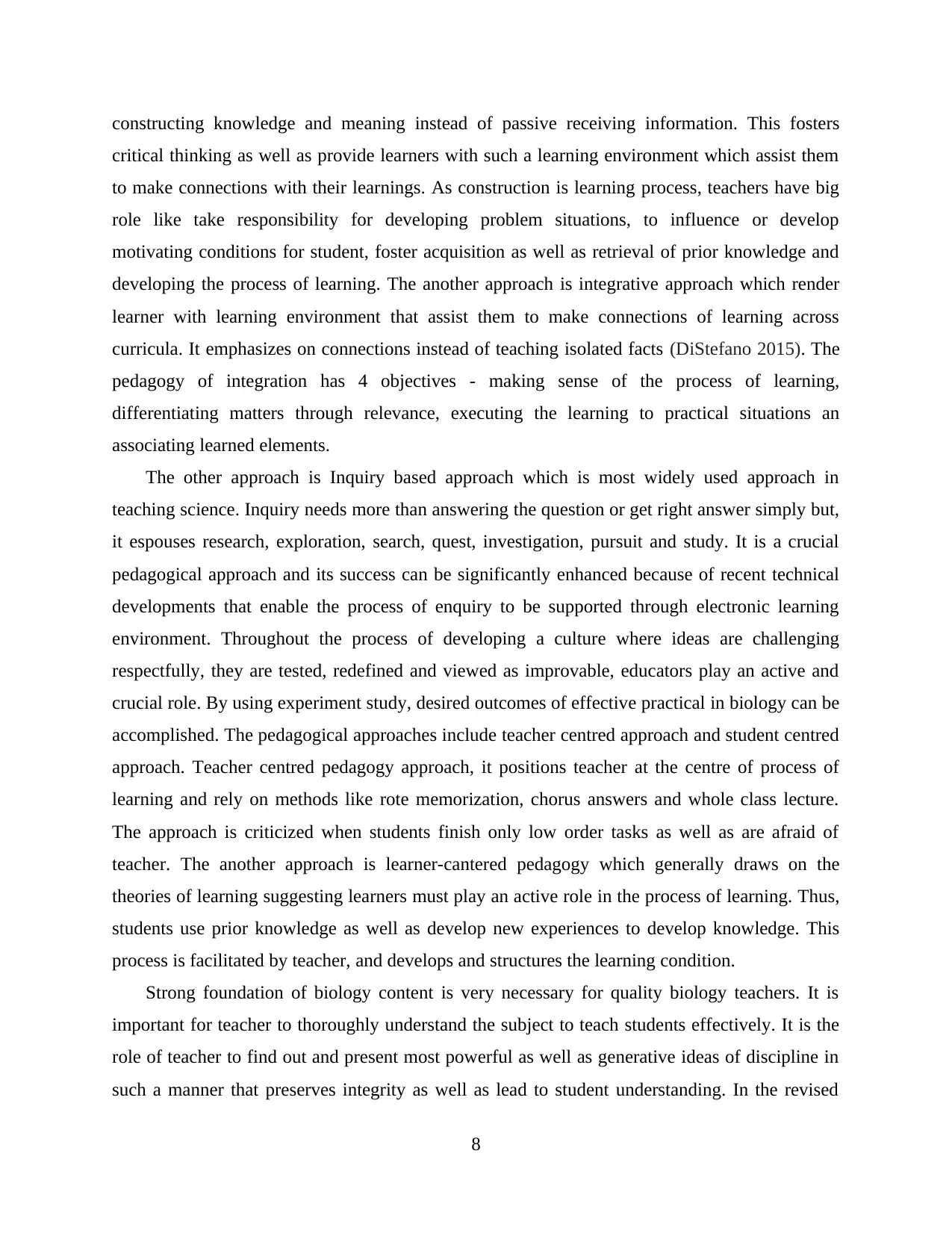
constructing knowledge and meaning instead of passive receiving information. This fosters
critical thinking as well as provide learners with such a learning environment which assist them
to make connections with their learnings. As construction is learning process, teachers have big
role like take responsibility for developing problem situations, to influence or develop
motivating conditions for student, foster acquisition as well as retrieval of prior knowledge and
developing the process of learning. The another approach is integrative approach which render
learner with learning environment that assist them to make connections of learning across
curricula. It emphasizes on connections instead of teaching isolated facts (DiStefano 2015). The
pedagogy of integration has 4 objectives - making sense of the process of learning,
differentiating matters through relevance, executing the learning to practical situations an
associating learned elements.
The other approach is Inquiry based approach which is most widely used approach in
teaching science. Inquiry needs more than answering the question or get right answer simply but,
it espouses research, exploration, search, quest, investigation, pursuit and study. It is a crucial
pedagogical approach and its success can be significantly enhanced because of recent technical
developments that enable the process of enquiry to be supported through electronic learning
environment. Throughout the process of developing a culture where ideas are challenging
respectfully, they are tested, redefined and viewed as improvable, educators play an active and
crucial role. By using experiment study, desired outcomes of effective practical in biology can be
accomplished. The pedagogical approaches include teacher centred approach and student centred
approach. Teacher centred pedagogy approach, it positions teacher at the centre of process of
learning and rely on methods like rote memorization, chorus answers and whole class lecture.
The approach is criticized when students finish only low order tasks as well as are afraid of
teacher. The another approach is learner-cantered pedagogy which generally draws on the
theories of learning suggesting learners must play an active role in the process of learning. Thus,
students use prior knowledge as well as develop new experiences to develop knowledge. This
process is facilitated by teacher, and develops and structures the learning condition.
Strong foundation of biology content is very necessary for quality biology teachers. It is
important for teacher to thoroughly understand the subject to teach students effectively. It is the
role of teacher to find out and present most powerful as well as generative ideas of discipline in
such a manner that preserves integrity as well as lead to student understanding. In the revised
8
critical thinking as well as provide learners with such a learning environment which assist them
to make connections with their learnings. As construction is learning process, teachers have big
role like take responsibility for developing problem situations, to influence or develop
motivating conditions for student, foster acquisition as well as retrieval of prior knowledge and
developing the process of learning. The another approach is integrative approach which render
learner with learning environment that assist them to make connections of learning across
curricula. It emphasizes on connections instead of teaching isolated facts (DiStefano 2015). The
pedagogy of integration has 4 objectives - making sense of the process of learning,
differentiating matters through relevance, executing the learning to practical situations an
associating learned elements.
The other approach is Inquiry based approach which is most widely used approach in
teaching science. Inquiry needs more than answering the question or get right answer simply but,
it espouses research, exploration, search, quest, investigation, pursuit and study. It is a crucial
pedagogical approach and its success can be significantly enhanced because of recent technical
developments that enable the process of enquiry to be supported through electronic learning
environment. Throughout the process of developing a culture where ideas are challenging
respectfully, they are tested, redefined and viewed as improvable, educators play an active and
crucial role. By using experiment study, desired outcomes of effective practical in biology can be
accomplished. The pedagogical approaches include teacher centred approach and student centred
approach. Teacher centred pedagogy approach, it positions teacher at the centre of process of
learning and rely on methods like rote memorization, chorus answers and whole class lecture.
The approach is criticized when students finish only low order tasks as well as are afraid of
teacher. The another approach is learner-cantered pedagogy which generally draws on the
theories of learning suggesting learners must play an active role in the process of learning. Thus,
students use prior knowledge as well as develop new experiences to develop knowledge. This
process is facilitated by teacher, and develops and structures the learning condition.
Strong foundation of biology content is very necessary for quality biology teachers. It is
important for teacher to thoroughly understand the subject to teach students effectively. It is the
role of teacher to find out and present most powerful as well as generative ideas of discipline in
such a manner that preserves integrity as well as lead to student understanding. In the revised
8
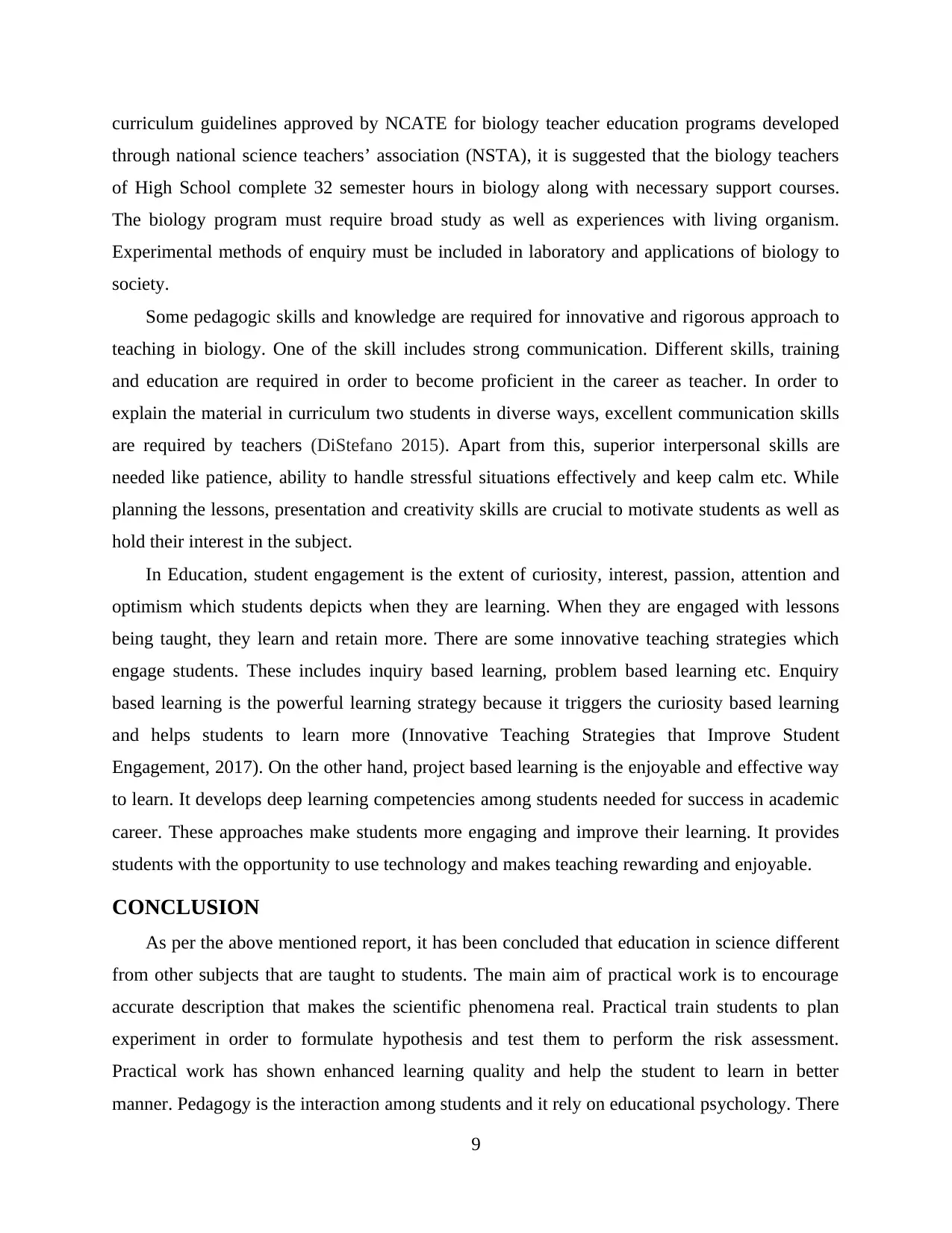
curriculum guidelines approved by NCATE for biology teacher education programs developed
through national science teachers’ association (NSTA), it is suggested that the biology teachers
of High School complete 32 semester hours in biology along with necessary support courses.
The biology program must require broad study as well as experiences with living organism.
Experimental methods of enquiry must be included in laboratory and applications of biology to
society.
Some pedagogic skills and knowledge are required for innovative and rigorous approach to
teaching in biology. One of the skill includes strong communication. Different skills, training
and education are required in order to become proficient in the career as teacher. In order to
explain the material in curriculum two students in diverse ways, excellent communication skills
are required by teachers (DiStefano 2015). Apart from this, superior interpersonal skills are
needed like patience, ability to handle stressful situations effectively and keep calm etc. While
planning the lessons, presentation and creativity skills are crucial to motivate students as well as
hold their interest in the subject.
In Education, student engagement is the extent of curiosity, interest, passion, attention and
optimism which students depicts when they are learning. When they are engaged with lessons
being taught, they learn and retain more. There are some innovative teaching strategies which
engage students. These includes inquiry based learning, problem based learning etc. Enquiry
based learning is the powerful learning strategy because it triggers the curiosity based learning
and helps students to learn more (Innovative Teaching Strategies that Improve Student
Engagement, 2017). On the other hand, project based learning is the enjoyable and effective way
to learn. It develops deep learning competencies among students needed for success in academic
career. These approaches make students more engaging and improve their learning. It provides
students with the opportunity to use technology and makes teaching rewarding and enjoyable.
CONCLUSION
As per the above mentioned report, it has been concluded that education in science different
from other subjects that are taught to students. The main aim of practical work is to encourage
accurate description that makes the scientific phenomena real. Practical train students to plan
experiment in order to formulate hypothesis and test them to perform the risk assessment.
Practical work has shown enhanced learning quality and help the student to learn in better
manner. Pedagogy is the interaction among students and it rely on educational psychology. There
9
through national science teachers’ association (NSTA), it is suggested that the biology teachers
of High School complete 32 semester hours in biology along with necessary support courses.
The biology program must require broad study as well as experiences with living organism.
Experimental methods of enquiry must be included in laboratory and applications of biology to
society.
Some pedagogic skills and knowledge are required for innovative and rigorous approach to
teaching in biology. One of the skill includes strong communication. Different skills, training
and education are required in order to become proficient in the career as teacher. In order to
explain the material in curriculum two students in diverse ways, excellent communication skills
are required by teachers (DiStefano 2015). Apart from this, superior interpersonal skills are
needed like patience, ability to handle stressful situations effectively and keep calm etc. While
planning the lessons, presentation and creativity skills are crucial to motivate students as well as
hold their interest in the subject.
In Education, student engagement is the extent of curiosity, interest, passion, attention and
optimism which students depicts when they are learning. When they are engaged with lessons
being taught, they learn and retain more. There are some innovative teaching strategies which
engage students. These includes inquiry based learning, problem based learning etc. Enquiry
based learning is the powerful learning strategy because it triggers the curiosity based learning
and helps students to learn more (Innovative Teaching Strategies that Improve Student
Engagement, 2017). On the other hand, project based learning is the enjoyable and effective way
to learn. It develops deep learning competencies among students needed for success in academic
career. These approaches make students more engaging and improve their learning. It provides
students with the opportunity to use technology and makes teaching rewarding and enjoyable.
CONCLUSION
As per the above mentioned report, it has been concluded that education in science different
from other subjects that are taught to students. The main aim of practical work is to encourage
accurate description that makes the scientific phenomena real. Practical train students to plan
experiment in order to formulate hypothesis and test them to perform the risk assessment.
Practical work has shown enhanced learning quality and help the student to learn in better
manner. Pedagogy is the interaction among students and it rely on educational psychology. There
9
⊘ This is a preview!⊘
Do you want full access?
Subscribe today to unlock all pages.

Trusted by 1+ million students worldwide

are some approaches and loading enquiry based approach, problem based learning etc. which
helps in effective learning of student.
10
helps in effective learning of student.
10
Paraphrase This Document
Need a fresh take? Get an instant paraphrase of this document with our AI Paraphraser
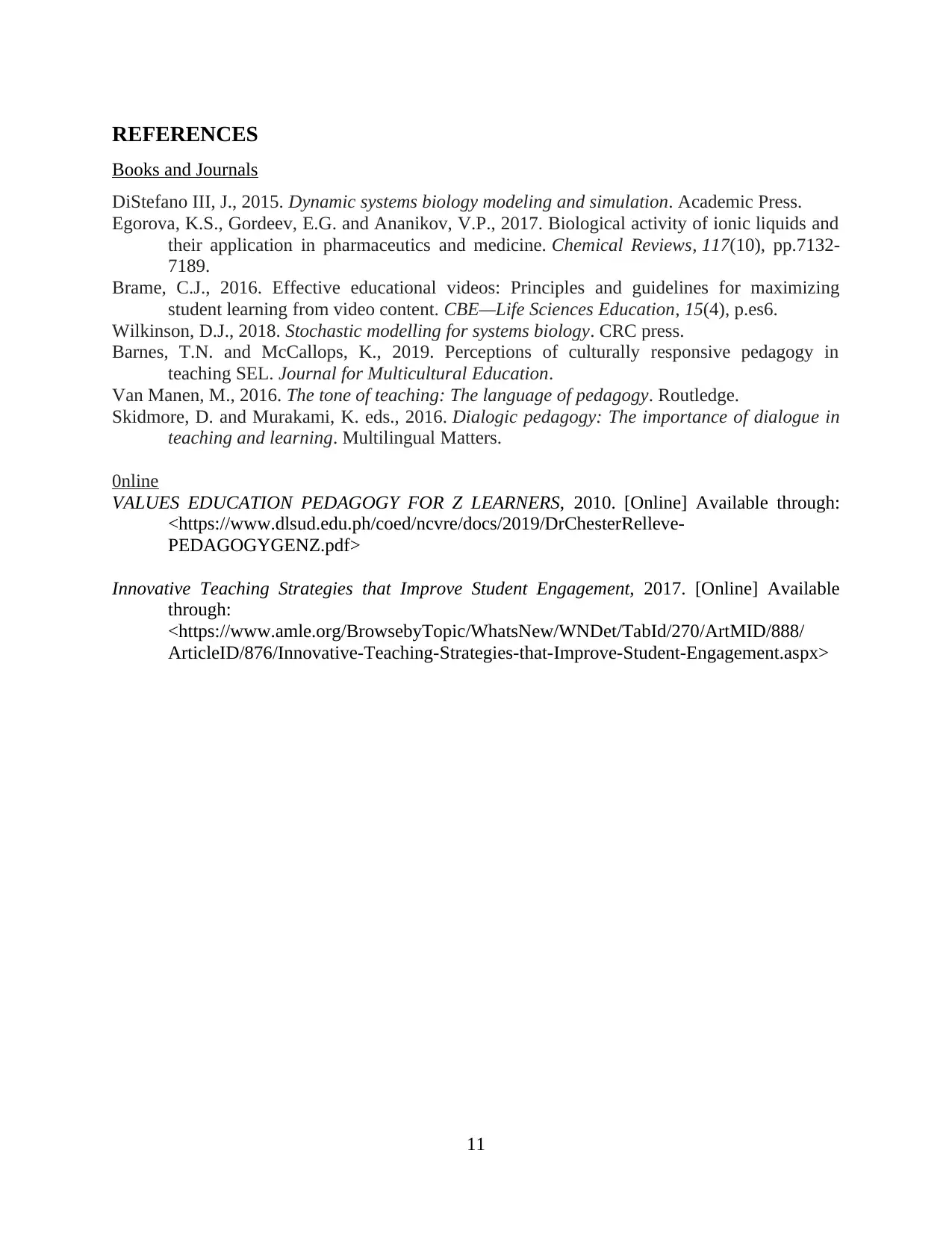
REFERENCES
Books and Journals
DiStefano III, J., 2015. Dynamic systems biology modeling and simulation. Academic Press.
Egorova, K.S., Gordeev, E.G. and Ananikov, V.P., 2017. Biological activity of ionic liquids and
their application in pharmaceutics and medicine. Chemical Reviews, 117(10), pp.7132-
7189.
Brame, C.J., 2016. Effective educational videos: Principles and guidelines for maximizing
student learning from video content. CBE—Life Sciences Education, 15(4), p.es6.
Wilkinson, D.J., 2018. Stochastic modelling for systems biology. CRC press.
Barnes, T.N. and McCallops, K., 2019. Perceptions of culturally responsive pedagogy in
teaching SEL. Journal for Multicultural Education.
Van Manen, M., 2016. The tone of teaching: The language of pedagogy. Routledge.
Skidmore, D. and Murakami, K. eds., 2016. Dialogic pedagogy: The importance of dialogue in
teaching and learning. Multilingual Matters.
0nline
VALUES EDUCATION PEDAGOGY FOR Z LEARNERS, 2010. [Online] Available through:
<https://www.dlsud.edu.ph/coed/ncvre/docs/2019/DrChesterRelleve-
PEDAGOGYGENZ.pdf>
Innovative Teaching Strategies that Improve Student Engagement, 2017. [Online] Available
through:
<https://www.amle.org/BrowsebyTopic/WhatsNew/WNDet/TabId/270/ArtMID/888/
ArticleID/876/Innovative-Teaching-Strategies-that-Improve-Student-Engagement.aspx>
11
Books and Journals
DiStefano III, J., 2015. Dynamic systems biology modeling and simulation. Academic Press.
Egorova, K.S., Gordeev, E.G. and Ananikov, V.P., 2017. Biological activity of ionic liquids and
their application in pharmaceutics and medicine. Chemical Reviews, 117(10), pp.7132-
7189.
Brame, C.J., 2016. Effective educational videos: Principles and guidelines for maximizing
student learning from video content. CBE—Life Sciences Education, 15(4), p.es6.
Wilkinson, D.J., 2018. Stochastic modelling for systems biology. CRC press.
Barnes, T.N. and McCallops, K., 2019. Perceptions of culturally responsive pedagogy in
teaching SEL. Journal for Multicultural Education.
Van Manen, M., 2016. The tone of teaching: The language of pedagogy. Routledge.
Skidmore, D. and Murakami, K. eds., 2016. Dialogic pedagogy: The importance of dialogue in
teaching and learning. Multilingual Matters.
0nline
VALUES EDUCATION PEDAGOGY FOR Z LEARNERS, 2010. [Online] Available through:
<https://www.dlsud.edu.ph/coed/ncvre/docs/2019/DrChesterRelleve-
PEDAGOGYGENZ.pdf>
Innovative Teaching Strategies that Improve Student Engagement, 2017. [Online] Available
through:
<https://www.amle.org/BrowsebyTopic/WhatsNew/WNDet/TabId/270/ArtMID/888/
ArticleID/876/Innovative-Teaching-Strategies-that-Improve-Student-Engagement.aspx>
11
1 out of 11
Related Documents
Your All-in-One AI-Powered Toolkit for Academic Success.
+13062052269
info@desklib.com
Available 24*7 on WhatsApp / Email
![[object Object]](/_next/static/media/star-bottom.7253800d.svg)
Unlock your academic potential
Copyright © 2020–2026 A2Z Services. All Rights Reserved. Developed and managed by ZUCOL.





